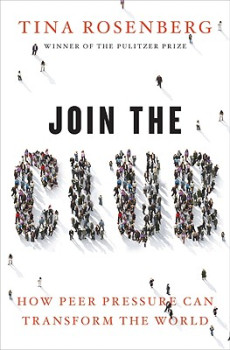
Join the Club: How Peer Pressure Can Transform the World
Tina Rosenberg
288 pages, W.W. Norton & Company, April 2011
Most books about history are about power. As you read them, you can feel the author being drawn in by the adrenaline rush, by the unconscious association with the larger-than-life heroes and villains of yesterday. But most history is not made by these figures. It is made by humanity, by people living out the mundanity of family life, earning an income, seeking better circumstances for their children. Just by trying to get on with their lives, most people have to contend with a world that the few—those with power—make for them.
A whole series of injustices arise from this power imbalance: a world where alcoholism and cigarette addiction are driven by the few to drive their corporate profits and fuel their greed; a world where fear and xenophobic nationalism are dressed up as patriotism, to keep people acquiescent and the powerful in power. Sometimes this power imbalance arises from the amoral logic of systems—markets that take no heed of the collateral damage of unemployment; food supply systems that are blind to malnutrition and obesity; cultural traditions that evolve into cruel hierarchies of class and caste and the diminishment of one race, gender, or caste to the point where it becomes second nature to the oppressed and abandoned to believe that their oppression and abandonment are the natural order of things.
And against this abuse, the common woman and man have one superweapon: the power of self-organized, self-supporting groups who throughout history have had the courage to stand up against the abuse of power.
Join the Club by journalist Tina Rosenberg could have been written at just about any point in history. It could have been written after the Chartists in the 1830s or the Peasants’ Revolt in the 14th century, after the ousting of Willem Kieft as director general of the early Dutch settlement of New Amsterdam or the 1912 Bread and Roses strikes of women in the mills of Massachusetts, or after the 1960s civil rights movement in Northern Ireland. Writing now, in the 21st century, Rosenberg reaffirms that the power of people to organize and to seek self-help remains a phenomenal force, regardless of technological advances.
In Join the Club, Rosenberg shows how peer support can change the lives of the individuals involved, can change a whole economy, can bring down dictators, and can strike back against a thousand years of caste oppression.
Her thesis is a simple one. People are fundamentally social animals. In isolation a person can never “be all that you can.” When we are able to harness the power of being part of a group, supporting and being supported by those around us, we can achieve extraordinary things. The message is one of hope. This is refreshing, given that most books on peer pressure focus on the negative: on gang warfare and adolescent drug use or the political blindness of gated communities.
Join the Club is largely descriptive. Part of chapter 2 delves into the science of why people are societal animals, summarizing new research in neurology and genetics. Such science is fertile new ground for enabling readers to better understand the evolutionary advantages of peer support or for making the case that what distinguishes Homo sapiens from apes is not brain size or calculating power but their cognizance of and place in social groups.
Yet Rosenberg does not build on this argument, scientifically or philosophically, nor does she make any new sociological conclusions. Rather, she makes the case for peer pressure though a series of case studies, most of which have appeared in other guises and often more analytically presented. She looks at how peer pressure enables successful antismoking campaigns, the empowerment of outcast women in India through microfinance, the revival of megachurches, the success of calculus clubs in universities, and, my favorite, the power of the campaign slogan “He’s Finished!” in the Otpor student movement of Serbia. In her concluding chapter, she muses on whether peer pressure can be harnessed to counter the allure of violent terrorism.
Each chapter is enjoyable to read as a stand-alone description, but one is left wondering why Rosenberg picked the subjects she did. Ultimately, Join the Club fails to build a compelling case. It is description without critique or analysis. It will sit on the same shelf as James Surowiecki’s The Wisdom of Crowds, Malcolm Gladwell’s The Tipping Point, or, going back three decades, Howard Zinn’s A People’s History of the United States in the way it reasserts that true power comes from within and from the support of our peers—not from wealth, technological supremacy, or fear. But I suspect it will be far less thumbed through than those texts.
Yet the basic message of the book is still true: Governments should always be a little afraid of their people.
Peter Walker is the Irwin H. Rosenberg Professor of Nutrition and Human Security at Tufts University and is director of the university’s Feinstein International Center, which develops operational and policy responses to protect the lives of people living in crisis-affected and marginalized communities. He was the founder of the International Federation of Red Cross and Red Crescent Societies’ World Disasters Report, and he helped develop the Code of Conduct for disaster workers and the Sphere humanitarian standards.

